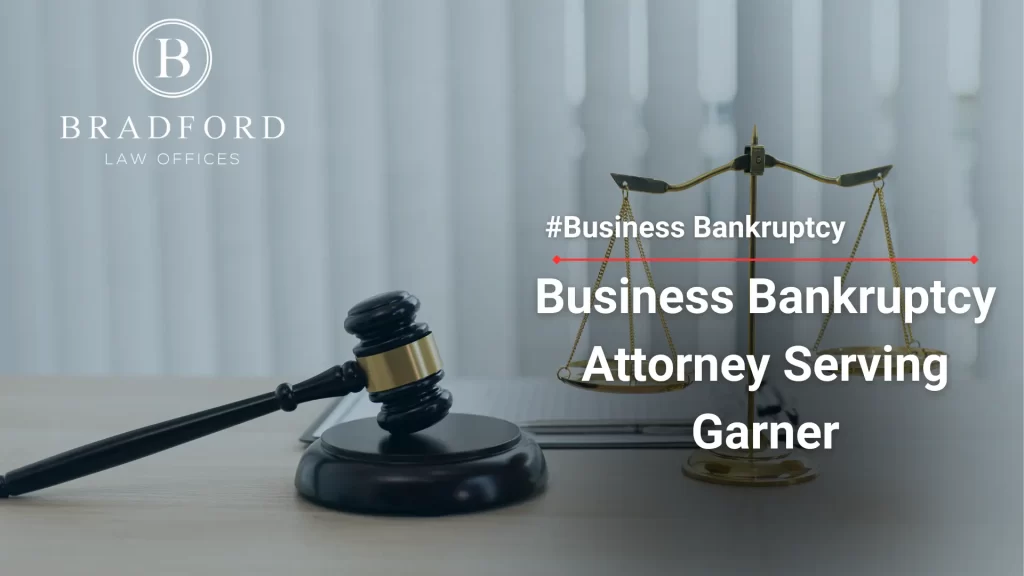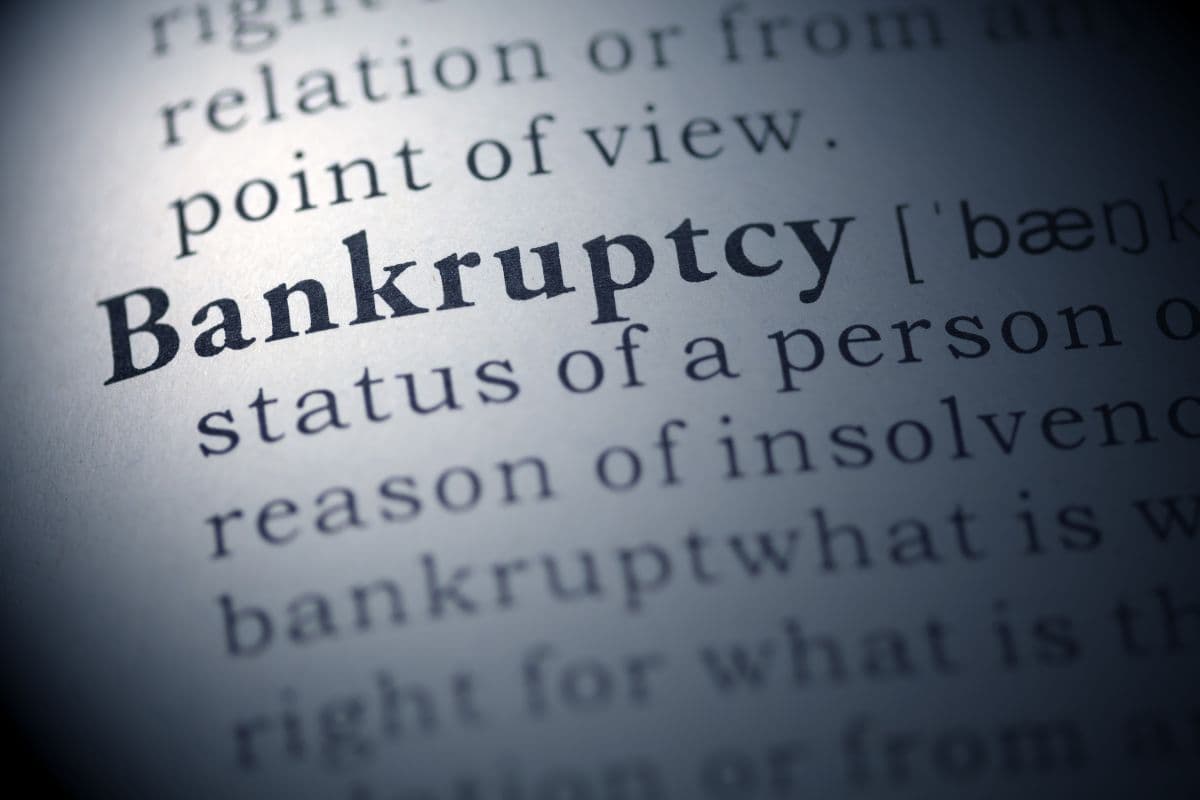
Every day, you’ve tried your best to live your life on your terms and stay afloat. But sometimes, your efforts can fall short and before you know it, you’re barely treading water.
This is the story for so many people across the country, especially in the midst of constant economic and life changes. Every year, thousands of businesses reach a level of financial strain for which they have to seek relief by filing for bankruptcy. In 2021, over 400,000 Americans filed for bankruptcy. You’re not alone in your need for help getting out from under financial debt.
You also don’t have to file for bankruptcy alone. The Garner business bankruptcy attorneys of Bradford Law Offices can help you explore the best financial relief options for your debt situation. With our decades of experience, we can help you navigate what can be a complex process. We’ll make your case a priority with our firm, and we’ll work with you so you begin your new financial journey with a clean slate.
Call the Garner business bankruptcy attorneys of Bradford Law Offices at (919) 758-8879 right away to pursue the relief you need.
Types of Bankruptcy
There are several types of bankruptcy that business owners can file to obtain financial debt relief.
Businesses can file one of three types of bankruptcies:
- Chapter 7 bankruptcy is also an option for business owners who need to be relieved of their business debts. A Chapter 7 business bankruptcy typically results in the liquidation or shuttering of the business, however.
- Chapter 11 bankruptcy is the most common type of bankruptcy for businesses. With Chapter 11 bankruptcy, the business’s debts are reorganized so they can be paid over time. The terms of the payment arrangement typically provide for more affordable payments over three to five years.
- Chapter 12 bankruptcy is reserved for fishermen and farmers. It’s similar to Chapter 11 bankruptcy in that it allows for fishermen and farmers to reorganize their business debts by being placed on a payment plan for three to five years until their debt is resolved.
Do I Qualify to File for Bankruptcy?
Each type of bankruptcy has different requirements.
Chapter 7 Bankruptcy
Chapter 7 bankruptcy is best for those who don’t have a lot of property or assets and not enough income to afford even a payment plan to resolve their debts. This is because, with Chapter 7 bankruptcy, the debtor’s property and assets are liquidated to pay some of their debt. The remaining debt will be discharged. (Not all debts are discharged. Bankruptcy law doesn’t allow some debts, such as student loans and back child support, to be discharged.)
To qualify for Chapter 7 bankruptcy, you have to meet certain income requirements. In North Carolina, you must pass a “means” test, which is a calculation that determines whether your income is more or less than the median income in the state. If your monthly income is less than the median, you’re probably eligible to file a Chapter 7 bankruptcy.
Chapter 11 Bankruptcy
Because it’s so expensive, Chapter 11 bankruptcy may be best for big businesses with the potential to continue earning profits in the future. However, small businesses aren’t precluded from filing for this chapter of bankruptcy. One benefit of Chapter 11 bankruptcy is that the business can remain in operation while the debtors are paying their debts according to the reorganization plan.
For small businesses to qualify for Chapter 11 bankruptcy, the business’ noncontingent liquidated unsecured and secured debts can’t be more than $2,725,625.
Chapter 12 Bankruptcy
To qualify for Chapter 12 bankruptcy, you must have a family farming or fishing business.
Chapter 13 Bankruptcy
To qualify for Chapter 13 bankruptcy, you also have to meet certain income thresholds. You need to make enough income to make payments according to your bankruptcy payment arrangement. Your secured debts can’t total more than $1,257,850 and your unsecured debts can’t total more than $419,275. (This amount changes periodically as the cost of living increases.)
To file for any type of bankruptcy, you can’t have received a dismissal in a recent bankruptcy case in the past 180 days. You have to wait until the 181st day after the dismissal to file another bankruptcy petition.
How to File for Bankruptcy
When filing for bankruptcy, you’ll have to submit a petition as well as a variety of documentation with the court. Depending on the type of bankruptcy you file, you may have to submit a thorough detailing of your debts and the creditors you owe, any property or assets you may have, your income, and your monthly living (or your business’ operating) expenses. Much of this information will be included in “Schedules.” These are bankruptcy forms that you’ll have to fill out as accurately and fully as possible.
What to Expect After Filing for Bankruptcy
After filing for bankruptcy, your bankruptcy case will be assigned to a bankruptcy judge. Depending on the type of bankruptcy you filed, your case may also be assigned to a trustee who will oversee the process. The bankruptcy court will also enter an automatic stay. This is an order requiring that your creditors stop any efforts they’ve been making to collect the payments you owe them. This stay is in effect until it is lifted, which usually occurs once the bankruptcy process concludes.
For Chapter 11, 12, and 13 bankruptcies, there will be court proceedings in which a reorganization or payment plan will be determined and will need to be confirmed. You’ll have to abide by the terms of your payment plan and make the necessary payments. If you don’t, your bankruptcy case could be dismissed and you’ll return to your original obligations to pay the debts. For Chapter 7 bankruptcy, there will be a meeting of the creditors, where you will appear along with your creditors who can make objections to the discharge of your debts with them. Ideally, your eligible debts will be discharged at the conclusion of a Chapter 7 bankruptcy.
Contact the Business Bankruptcy Attorneys at Bradford Law Offices in Garner, NC
If you’re facing serious financial strain and growing debt or are considering filing for bankruptcy, you need an experienced bankruptcy attorney to help guide you through the bankruptcy process. You don’t want to unnecessarily delay getting the financial relief you need. Call the Garner business bankruptcy attorneys of Bradford Law Offices at (919) 758-8879 immediately.

